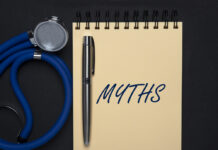In the September, 2015 issue of JAMA Psychiatry, a team of Swedish researchers (see Frick et al.) published a study evaluating the serotonin system in persons with social anxiety. They used Positron Emission Tomography an imaging technique wherein radio-active molecules that will bind in particular places in the brain and then allow for quantification of particular molecules in the brain are employed. The researchers used two different molecules: [11C]5-HTP, which is a precursor to the production of serotonin and 5-hydoxytryptophan labeled with Carbon-11 that will bind to the serotonin transporter.
What the researchers found was an increase in both of these substances in brain areas that are known to be active during the experience of anxiety, viz.; the amygdala and the dorsal Anterior Cingulate Gyrus. The researchers concluded, “Collectively, these findings suggest that extracellular serotonin in the amygdala and dorsal ACC is positively related to severity of social anxiety symptoms” (p. 789). Translated into English, the researcher found that more serotonin release occurs during social anxiety.
Of course, the findings here are in direct contradiction to what the pharmaceutical companies would have us believe: that anxiety and depression are caused by deficit levels of serotonin. There was an editorial by Stein and Andrews published in the same issue of JAMA Psychiatry in the “Clinical Review and Education” section which attempted to obfuscate the findings by referencing the heterogeneity in persons who exhibit social anxiety.
Unfortunately, neither the Frick et al. article or the editorial referenced the work of neuroscientist Steven Maier on learned helplessness. Neuroscientists for the last 30 years have been investigating what happens in the brains of animals that are subjected to uncontrollable stress. Given uncontrollable shock, for instance, animals appear depressed and essentially “give-up”; failing to make responses that could turn off the shock even when the opportunity is presented. It turns out that one of the first areas to be activated by uncontrollable shock contains serotonin neurons in the caudal-dorsal raphe that project to the amygdala. If these serotonergic neurons are destroyed, then; no learned helplessness. The Frick et al. findings are very consistent with the animal work: serotonin creates anxiety/depression.
While the Frick et al. findings are consistent with data on learned helplessness, Chris Lowry, a colleague of Steven Maier at University of Colorado, has identified multiple serotonin circuits in the raphe. While one of these circuits produces learned helplessness, another circuit turns it off. Thus, serotonin is just another work-horse neurotransmitter capable of creating opposite effects. It’s the connections among the neurons, not the particular chemical making the connections, that determines the outcome. This is another “bad news” story for the pharmaceutical houses because ingesting a chemical such as an SSRI, which presumably elevates serotonin in all circuits, will yield unpredictable effects. There is no way given current technology to target the serotonin neurons you want.
What is clear from the two articles in JAMA Psychiatry is that psychiatrists are still focused on serotonin. Whatever glib statements psychiatry-spokespersons utter for the general public (“we always knew it was more complicated”), in the psychiatric journals, where psychiatrists talk to each other, they acknowledge having bought the assumption that low serotonin creates anxiety. Indeed, Stein and Andrews reflect “how do we understand the apparent paradox that potentiated serotonin signaling might underlie increased anxiety-related endophenotypes and the possible predisposition for developing anxiety disorders with the fact that some patients respond to SSRIs, which presumably further increases extracellular serotonin levels?” As they went through tortured possibilities they could not resolve the paradox. If they read the animal literature, it’s far less confusing.
* * * * *
References:
Frick, A., Åhs,F., Engman, J., Jonasson, M., Alaie, I., Bjöekstrand, J., Frans, O., Faria, V., Linnman, C., Appel, L., Wahlstedt, K., Lubberink, M., Fredrikson, M., & Furmark, T. (2015). Serotonin synthesis and reuptake in social anxiety disorder: A positron emission tomography study. JAMA Psychiatry, 77 (8), 794-802.
Stein, M. B., & Andrews, A. M. (2015). Serotonin states and social anxiety. JAMA Psychiatry, 77 (8), 845-847.















Love the title, Jill, “Serotonin Is Still Alive and Well in Psychiatry Land.” I would call it “la, la, delusia land,” based on my experience with psychiatrists.
No doubt psychiatrists confusion and delusions are due to this type of newer research which, “found that more serotonin release occurs during social anxiety. Of course, the findings here are in direct contradiction to what the pharmaceutical companies would have us believe: that anxiety and depression are caused by deficit levels of serotonin.” Thus, we’re looking at lots and lots of psychiatric malpractice, albeit due to ignorance and misinformation.
My personal theory is the Creator likely made the human brain far too complex for mere mortals to ever completely comprehend, because mere mortals have proven over and over again that they have moral and ethical deficiencies, leading to too much information being used for evil, rather than good. For example, the psychiatric industry’s “dirty little secret of the two original educated professions” use of the psych drug cocktails to created anticholinergic toxidrome induced “psychosis,” which makes people really sick, and allows the psychiatrists to discredit patients, so the psychiatrists can proactively prevent non-existent, but legitimate, potential malpractice suits due to the easily recognized iatrogenesis of the incompetent mainstream doctors, and also cover up the child abuse and rape hobbies of the religious leaders.
But it is a shame the psycho / pharmaceutical industries have for decades been deluding the mainstream doctors, and the public, into believing they “know everything about the meds” and how the human brain functions. Since, obviously, that’s just lies.
It does seem we do have at least a couple of industries filled with people, who have betrayed the rest of humanity, and are in fact currently functioning as a cancer on the entirety of humanity. Wisdom has it’s sad side, but it’s not caused by “depression,” it’s caused by disgust.
Report comment
Regarding this: “how do we understand the apparent paradox that potentiated serotonin signaling might underlie increased anxiety-related endophenotypes and the possible predisposition for developing anxiety disorders with the fact that some patients respond to SSRIs, which presumably further increases extracellular serotonin levels?”
To these psychiatrists I say: What planet are you people from? Shut the hell up and start listening to anxious people as individuals in a social context. This neurotrash blather hasn’t contributed to improving outcomes one iota for decades. Just give up already.
Research psychiatrists are people getting down on their hands and knees on a beach, putting their nose down to the ground and studying individual grain of sands to try to understand why people enjoy a day at the beach. Psychiatrists are the ultimate personification of missing the forest for the trees.
Jill, I wonder if it is even worth reporting on this trash. The only reason they come out with it is to keep their job. They’re not real scientists or doctors.
Report comment
BPD
While I don’t disagree with much of what you say, I believe that every study such as this that throws doubt onto psychiatry’s methods and exposes it lies and hence is a step along the way to the approach you espouse.
Such studies and their reporting also potentially will provide the basis for the overturning of forced drugging in that they make it clear that anti-depressants actually do the opposite of what they’re alleged by pharma and psychiatrists to do and even add to suffering people’s misery by triggering chemical reactions in the brain that lead to anxiety and quite possibly learned helplessness.
While we in survivor-land know from bitter (and very frightening) experience that this is the case, and that psychiatry and pharma would like to continue to hide the facts, it will be far harder for them to claim ignorance if study after study puts ever more evidenced-based data onto the table that contradicts their stance either explicitly or implicitly.
While I agree that their stance is indefensible, they have marketed it such that it has become the widely accepted paradigm and it now falls to organisations such as MIA and CEPUK to expose it for the baseless rubbish it is – this situation is crap, but it is a fact of life.
We are in the perverse position of being forced to repeatedly disprove by scientific means a theory which never had any scientific basis to begin with using studies designed to prove and/or based on the assumed veracity of that original theory! But then, that’s psychiatry. Truly Alice in Wonderland stuff.
It is a reasonable expectation that doctors remain abreast of developments and research in their field, and they and pharma will have far fewer places to hide with the wide distribution of studies which contradict their paradigm when the broader community finally “gets it” and goes after them big time.
This study may well be yet another “nail in the coffin” of biological psychiatry, along with the one to which Robert Whitaker recently referred in his “Timberrr” piece.
Report comment
Kim,
Thanks for these astute points you made. I agree. Studies can help as well as hurt. What upset me about this particular study is how even when something is found that counters the biological psychiatry narrative, the authors cover it up and reinterpret it in distorted self-serving ways. That is what I was criticizing. I guess sometimes my disdain (is that too weak a word?) for psychiatrists and their hollow research causes me to overgeneralize or throw out the good with the bad.
I like the metaphor of Alice in Wonderland for psychiatric researchers’ minds. Another good one is Dead Man’s Alley – the wasteland in T.S. Eliot’s poems, where the voracious persecutory rats have gnawed and devoured the bones of hope and redemption. That is the sense one sometimes gets from this research, where problems are described as lifelong incurable illnesses… the descriptions reveal a profession devoid of real hope or humanity.
Report comment
“What upset me about this particular study is how even when something is found that counters the biological psychiatry narrative, the authors cover it up and reinterpret it in distorted self-serving ways. ”
Oh yes…that happens with monotonous regularity. All one has to do is look at the basis on which psychiatric drugs were (and still are being) approved …and the study Robert refers to in his “Timberrrr” piece.
All purport to be positive, but when read in full and analysed a different story emerges. I guess the researchers know there’ll be no more money for them unless they at least try and “polish the turds” that are psychiatry and psychiatric drugs.
Thankfully, people like Robert and many of the other authors here on MIA, as well as people like 1boringoldman are onto the lark and are happy to point out that really, no matter how much you polish a turd, it remains just what it is – a turd – and the polisher ends up covered in “it”.
Agree with the Dead Man’s Alley metaphor – it is cruel and sad that so many are sucked into it. Evil, even. I hold psychiatry in contempt, really.
There are some decent people among its members, as evidenced by MIA authors and 1Boringoldman, but generally I believe contempt, disgust, abhorrence and disdain are pretty healthy reactions to the actions and attitudes of psychiatry.
Report comment
They haven’t got much of a clue anyway so this presents a good opportunity for saying anything they like (the ‘neuroscientists’ I mean).
Report comment
“…which attempted to obfuscate the findings by referencing the heterogeneity in persons who exhibit social anxiety.”
Well, if social anxiety is “heterogeneous,” then what’s the point of calling it a diagnosis and trying to “treat” it chemically? How is this any different than someone smoking a joint or taking a few shots of Johnny Walker’s Red to make themselves feel better?
If it’s not homogeneous, it can’t be “caused” by anything specific, by definition. So it’s not a medically treatable entity, it’s just a name you are giving for feeling a certain way. And any drug you’re taking isn’t a “treatment,” it’s just a way of temporarily feeling better. Why is this not obvious?
—– Steve
BTW, I could certainly have qualified for a “Social Anxiety Disorder” diagnosis as a child and a teenager. I can tell you that sufficient alcohol was a magical “treatment” for the condition – enough drinking and I stopped worrying what people thought about me and became quite the social butterfly! So why don’t we just use alcohol as a “treatment” for “SAD?” Rhetorical question…
Report comment